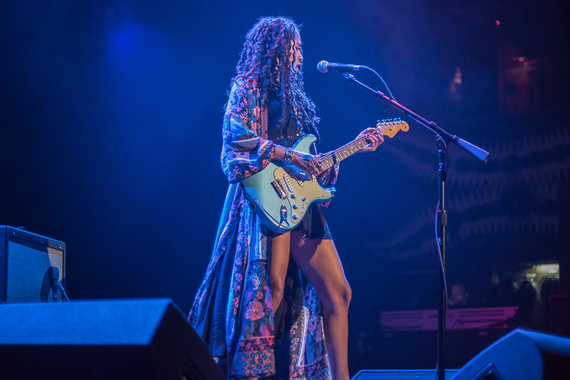
Mayaeni (Photo by Johnny Nevin)
Do you believe that a first impression can tell you a lot? Well, when you find out about Mayaeni -- maybe if you see her on tour, or listen to her new Elocution EP -- you might want to be careful about that first impression. There's a lot that's striking about Mayaeni and her music, so your first impression could be a lot of different things -- it just depends on what strikes you first. But you could still miss a lot.
For real? Yeah, she puts so much into what she's doing that you might want to keep listening, and keep watching, for the things you didn't notice right away.
If you see her in her current solo tour, for example, it may be that what stands out right away is her guitar. She walks out on stage by herself and stands in front of a new crowd, with a microphone in front of her and an amp behind her. It's just her and her Strat, and as she sings, she lays down soulful rhythm parts for her only accompaniment. She plays them like a lead player though, the way Hendrix did in songs like "The Wind Cries Mary", and when she wants to, she can step out too. Sometimes she plays a couple of bars of a rhythm part into a loop pedal, and playing lead against it, she really drives a crowd.
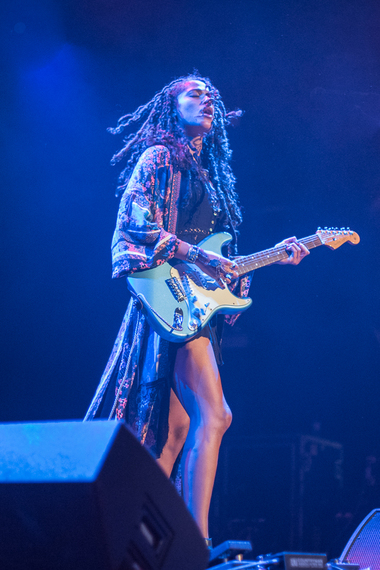
Mayaeni (Photo by Johnny Nevin)
On the other hand, if you didn't see any of that and just listened to Elocution, it may have been her voice that struck you. It's a brand-new-old-school kind of special, smooth and rough, sometimes rich with emotion, sometimes just rich with cool, and it's memorable right away.
For real? Yeah, but those are really just first impressions. When something is real, it always has a lot more to it than you can see or hear right away. It can be deeper and wider and stronger than anything that will fit into a first impression or two.
Mayaeni's music is a good example. For one thing, the way that she looks at what she's doing is probably a little different than any of those first impressions. "I consider myself a writer first, a singer second, then a guitar player," she says. Whether or not that was your first impression, it's probably true that the more you hear her sing, the more you can't help but get wrapped up in her songs. You might be struck by the way that she can lean her vocal into the rhythm of her writing, or by the many different shades of mood and motive she explores. She writes in layers of cascading insight and introspection, and she sings and plays what she writes with soulful clarity.
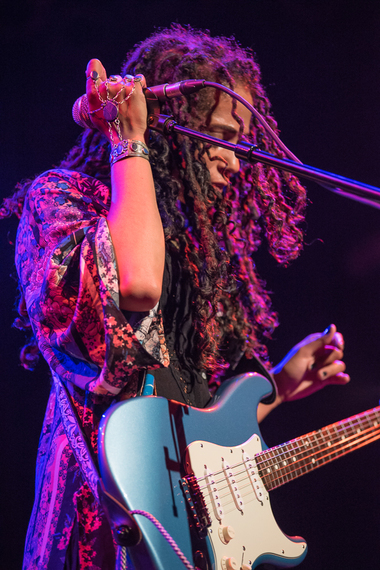
Mayaeni (Photo by Johnny Nevin)
Her writing is a lot of what got her noticed -- much of what's happening now came out of the publishing deal she signed with Sony a few years ago. But it was also her easy-to-admire vocals that got the attention of Roc Nation, the label Jay Z founded in 2008. It's something she has a lot of appreciation for in other singers who she's admired. "I tend to like slower voices a lot, like lower tones, raspy tones," she says. "If you go far back of course, there are like the Sam Cooks and all of that, Otis Redding and those songs. I always loved those -- I always loved the soul singers."
You can hear that appreciation in what she brings to her own vocals, but they ride on top of a definite rock vibe. She's from Detroit, so she grew up immersed in the twin heritages of soul and rock. Her Dad was a successful guitar player, before changing careers to be able to stay in town with his then young family, and she learned what a guitar can do from him. "He's an incredible guitar player," she says, "so I wasn't really fazed by other guitar players growing up. Still to this day I feel like no one's really better than my Dad."
She didn't start out playing electric -- her previous release, Cold Love, is almost entirely acoustic. "My music has always been guitar based, because that's how I started writing tracks when I was younger," she says. "I really started it out of necessity to write."
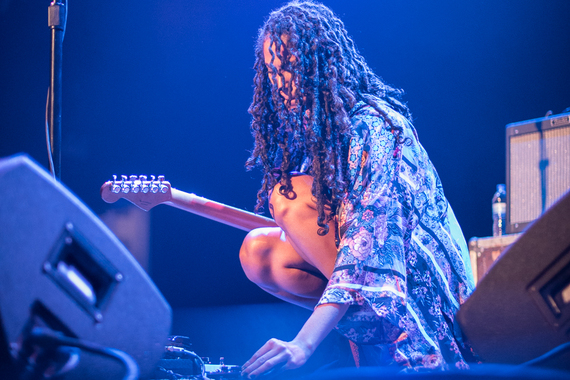
Mayaeni (Photo by Johnny Nevin)
She bought an electric one day on her way to one of the Cold Love sessions. "I was in L.A. and I was headed to the studio, and I drove past Guitar Center," she remembers. "I wasn't even planning to buy a guitar that day, I was just going in there, and I just loved the color of that one." It's still the only one she plays. "I've changed out some of the parts, like the pickups and stuff, got a new neck and stuff to make it a better guitar, but that's the only guitar."
For a few million people or so, none of that had anything to do with their first impression of Mayaeni. Why that doesn't matter now is a remarkable story, and quite an insight into how real what she's doing is to her.
She wrote a song called "Nothing Inside", and one of EDM's most influential DJ/Producers, Sander van Doorn, heard it. He was so enchanted with her vocal that he got in touch with Sony Publishing to ask if he could remix it, but when they asked Mayaeni, she said no. Van Doorn mixed it anyway, as a bootleg that he could only play at his shows, but the crowd reaction to it was so intense that Sony asked Mayaeni if she'd reconsider. When she heard what Van Doorn had done, she agreed. "It was a complete ballad," she explains. "I was worried he was going to speed up my voice or something, but then I heard what he did, so I said yeah, of course."
It turned into a major worldwide hit, topping the Beatport charts, and Mayaeni performed it live in front of thousands of people in Miami, at the city's hugely influential dance festival. It was the kind of career-launching success that most artists only dream of, but Mayaeni never even looked over her shoulder.
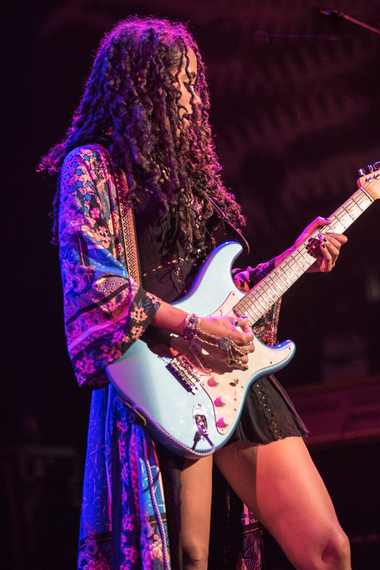
Mayaeni (Photo by Johnny Nevin)
Still, that was actually what first got Roc Nation's attention. "Even when I told them I don't do EDM," Mayaeni says, "they said we don't care, whatever's in that voice, there's something there." They meant it, too. "They're genuine, real people," she says. "I've been with them four years now, so they definitely let me take my time and figure it out."
Which is exactly what it takes, when all you want to do is what's real. "I don't know what else to do, I never have -- this is the only thing that felt right," she says. "I guess this is just who I am."
For real? Yeah, but it might be understatement. It might leave out a lot, like the future, for example. You get a glimpse of what that future could be like in the first two lines she sings in the last track on Elocution, a beautiful song called "Break Me".
"I hope you brought your shovel," she sings, "If you want to dig deep down in my soul." So there could be a lot more. Maybe everything that you can see and hear from Mayaeni now, striking though it is, will look later like it was just a really good first impression.
For real? Yeah, for real.
This story originally appeared at aotpr.com
